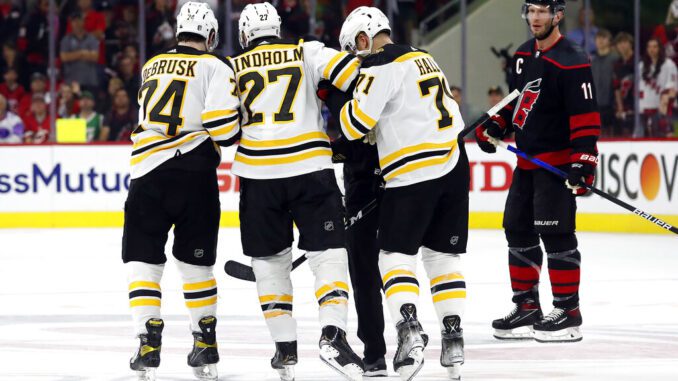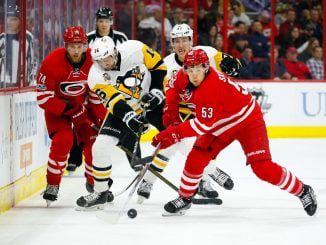
BOSTON — A big hit, like the one Hurricanes forward Andrei Svechnikov delivered to Bruins defenseman Hampus Lindholm in Wednesday’s Game 2, can alter both a game and a series.
Lindholm did not return, won’t play in Friday’s Game 3 and time will tell if he gets back in the lineup for the first round series.
There are certainly players with reputations as headhunters that don’t have the respect of their peers around the league. In most situations, players know the physical part of the game isn’t personal.
Hurricanes defenseman Brady Skjei probably didn’t expect to be facing his old team when the NHL resumed play in the 2020 playoff bubble just months after he was traded away.
And then-Rangers forward Jesper Fast probably didn’t expect his former teammate to knock him out of the series with a concussion-causing body check in the opening minutes of the first game.
The two had been together for more than four seasons in New York, and Fast has been a favorite of teammates in both Carolina and the Big Apple, winning awards in both cities for being an ideal teammate.
“We’ve always been good friends,” Fast said. “We would drive with each other to the rink in New York. I talked to him afterwards. Nothing bad there.”
Two months later, Fast signed with Carolina and was reunited with Skjei.
“He knew there was nothing personal. … You’re not trying to hurt a guy,” Skjei said.
Svechnikov said as much after Game 2.
“I like the physical part of the game, but I feel bad for that guy,” Svechnikov said. “It was a pretty hard hit, and I was in that spot where I kind of have to hit it. I had time there and he didn’t see me, but I had to do that. But obviously I feel bad and sorry for him.”
Some players are more willing than others to engage in the physical part of the game, but everyone knows what they’ve signed up for once they step over the boards.
“You’re just trying to just lay a clean hit, and that was the same thing (Wednesday),” Skjei said. “I thought it was a clean hit, but obviously you never want to see someone wobbly legged like that. I’m sure Svech feels the same way. He’s looking to make an impact but doesn’t want to hurt the guy.”
The apologies and well wishes sometimes go beyond public comments. When Capitals captain Alex Ovechkin knocked out Svechnikov during a fight in Game 3 of their first round playoff series in 2019, the veteran contacted his young countryman in the aftermath to check in on his well-being.
That’s not hard these days: Players either already have a connection to their opponent or can have the team’s public relations staff contact the opposing team and quickly exchange players’ cell numbers so they can get in touch if they feel it’s necessary.
“Throughout the season, if a guy gets hit in the face with a puck or stick, loses some teeth or something like that, usually you get a text from the guy on the other team,” Skjei said. “Everyone’s got each other’s numbers in some way or another.
“There’s that camaraderie after the games, you feel bad for the guy and hopefully he’s gonna be OK.”
But before cell phones became constant appendages, the process wasn’t as easy.
“Back then it wasn’t like everyone was texting or anything,” said Shane Willis, a former NHL player who works for the team and is filling in as the team’s TV color analyst. “But no one wants someone to get hurt.”
Willis was among the players victimized by Hall of Fame defenseman Scott Stevens, whose hit in the 2001 Stanley Cup Playoffs knocked the Hurricanes rookie out of the game and series.
Willis came back the next season and missed the first three games of the season with back issues before Bryan Marchment — perhaps the most notorious of the aforementioned headhunters — elbowed him in the head.
Marchment was suspended six games and Willis was never really the same. He was traded to Tampa Bay later that season and only played 33 games with the Lightning in two-plus seasons with the organization.
After time overseas, he returned to the Hurricanes organization but was sent to the AHL. He retired at age 32, unable to fulfill the promise of his 20-goal rookie season.
The Stevens hit was clean by the NHL standards of the time. The Marchment one wasn’t and still isn’t.
“You hope that players don’t cross that line,” Willis said. “Hit hard, it’s clean, it’s part of the game, right? But don’t take liberties in those situations. That’s always a concern. Overall, the league has gotten better with that.”
Neither Stevens nor Marchment reached out to Willis after their hits on him, and Willis said Svechnikov wishing Lindholm well in the postgame press conference is probably enough of an olive branch between two players who don’t know each other aside from competing on the ice.
“In no way does he need to reach out,” Willis said. “When Lindholm does come back, a little tap on the pads (is probably enough). … We all know Andrei, how good of a guy is. I’m sure he doesn’t want to see that happen, but he’s doing what he does and hitting hard.”



